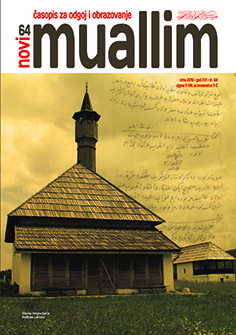“TEMELJI MUDROSTI O UREĐENJU SVIJETA” HASANA KAFIJE PRUŠČAKA I NIKOLO MAKIJAVELIJEV “VLADAR"
DOI:
https://doi.org/10.26340/muallim.v16i64.94Ključne riječi:
Pruščak, Makijaveli, Temelji mudrosti, Vladar, savjetovanje, vizija, sudbina, Hasan Kafija PruščakSažetak
UDK 321.01:929 Machiavelli N.
321.01:929 Pruščak H.K.
Tekst predstavlja izlaganje s naučnog skupa “400 godina djela Hasana Kafije Pruščaka (1615.-2015.)” u Gazi Husrev-begovoj biblioteci u Sarajevu i u metodološkom smislu komparativnog je karaktera. U uvodnom dijelu
tekstu iznesena su općenita i uporedna biografska razmatranja Hasana Kafije Pruščaka, bošnjačkog autora i mislioca osmanskog zrelog doba i Nikole Makijavelija, predstavnika ranog evropskog renesansnog političkog previranja. Glavni dio rada tretira drugo poglavlje o “savjetovanju, istihari, mišljenju i razmišljanju” – Pruščakova najpoznatijeg djela Temelji mudrosti o uređenju svijeta i poglavlje “o vladarevim ministrima”, odnosno, poglavlje “koliko može sudbina u onome što je ljudsko i kako joj se možemo oduprijeti” iz Vladara Nikole Makijavelija. Namjera je da se na primjeru dvojice protagonista, bez detaljnih pretenzija, ukaže na osobeni stil i povijesno-geografsku pozadinu u promišljanju političko-društvenih motivacija i kauzaliteta, koji će dovesti do odvijanja suprotnih historijskih procesa i sadašnjih političkih zaključaka. U radu je sugerirano svraćanje pozornosti na važnost političkog savjetovanja s učenima i upućenim mladima ljudima s ciljem razvijanja jedne politički i društveno odgovorne vizije.
References
Downloads
Objavljeno
How to Cite
Broj časopisa
Rubrika
License
Naknada:
a. Časopis ne naplaćuje naknadu za obradu članaka (APC) i naknadu za podnošenje članaka.
Autori koji objavljuju u ovom časopisu pristaju na sljedeće uvijete:
- Autori zadržavaju autorska prava i pružaju časopisu pravo prvog objavljivanja, pri čemu će rad jednu godinu po objavljivanju biti podložan licenci Creative Commons imenovanje koja omogućuje drugima da dijele rad uz uvijet navođenja autorstva i izvornog objavljivanja u ovom časopisu.
- Autori mogu izraditi zasebne, ugovorne aranžmane za ne-ekskluzivnu distribuciju rada objavljenog u časopisu (npr. postavljanje u institucionalni repozitorij ili objavljivanje u knjizi), uz navođenje da je rad izvorno objavljen u ovom časopisu.


